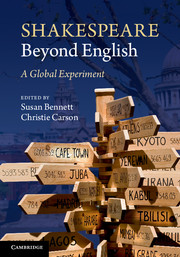Book contents
- Frontmatter
- Contents
- List of Illustrations
- List of colour plates
- Notes on contributors
- Foreword
- Acknowledgements
- Introduction
- The Globe to Globe Festival: An Introduction
- Performance Calendar
- Week One
- Chapter One U Venas no Adonisi
- Chapter Two Festival showcasing and cultural regeneration
- Chapter Three ‘What's mine is yours, and what is yours is mine’
- Chapter Four ‘The girl defies’
- Chapter Five Pericles and the Globe
- Chapter Six Technicolour Twelfth Night
- Week Two
- Week Three
- Week Four
- Week Five
- Week Six
- Afterwords
- Index
- Plate section
- References
Chapter Five - Pericles and the Globe
Celebrating the body and ‘embodied spectatorship’
Published online by Cambridge University Press: 05 June 2014
- Frontmatter
- Contents
- List of Illustrations
- List of colour plates
- Notes on contributors
- Foreword
- Acknowledgements
- Introduction
- The Globe to Globe Festival: An Introduction
- Performance Calendar
- Week One
- Chapter One U Venas no Adonisi
- Chapter Two Festival showcasing and cultural regeneration
- Chapter Three ‘What's mine is yours, and what is yours is mine’
- Chapter Four ‘The girl defies’
- Chapter Five Pericles and the Globe
- Chapter Six Technicolour Twelfth Night
- Week Two
- Week Three
- Week Four
- Week Five
- Week Six
- Afterwords
- Index
- Plate section
- References
Summary
As an American theatre professor at a small regional institution in Columbus, Georgia, I have been fortunate to experience many Globe performances since it opened in 1997. While I do not consider myself a Shakespeare ‘expert’, my experiences as an academic and director interested in cross-cultural theatre provided a rich connection with the Globe to Globe Festival's interplay of cultures. More specifically, as a study-abroad instructor in London, I have, time and again, and with up to ten students in tow, waited in the queue outside the Globe an hour or more before show time to secure the most coveted ‘front row’ groundling spaces in the yard. Given this experience, I approached the Globe to Globe production of Pericles by the National Theatre of Greece with the anticipation of a ‘regular’ Globe audience member. As such, I have come to expect the free interplay between actor and audience, stage and space that the Globe offers. It is largely the actor–audience relationship that provides each production its essential magic – something I have often pondered as we move further away, culturally, from live performance towards digital entertainments. After experiencing the Greek Pericles (and Hindi Twelfth Night – the other production I saw live), I have come to view the Globe's capacity for engaging audiences as an extension of the space itself – and the ways in which that particular environment interacts with bodies.
- Type
- Chapter
- Information
- Shakespeare beyond EnglishA Global Experiment, pp. 63 - 67Publisher: Cambridge University PressPrint publication year: 2013
References
- 1
- Cited by



